Comprehensive Report: Clinical Investigator's Key Responsibilities
VerifiedAdded on 2021/04/17
|6
|1328
|71
Report
AI Summary
This report provides a comprehensive overview of the responsibilities of clinical investigators in clinical trials. It emphasizes the importance of ethical conduct, ensuring participant safety and rights, and adhering to regulations. Key responsibilities include maintaining ethical standards, obtaining informed consent, keeping accurate records, reporting adverse events, and playing an oversight role in the handling of investigational agents. The report stresses the investigator's role in protecting the integrity of the research, promoting the well-being of participants, and ensuring the reliability of clinical trial outcomes. The report also highlights the significance of thorough protocol review, and the importance of involving participants and their representatives in the research process. Accurate record-keeping, including medical records and deviations from the protocol, is also discussed as vital for the integrity of the research. The report concludes by reiterating the critical role clinical investigators play in the success of clinical investigations and the protection of participant rights.
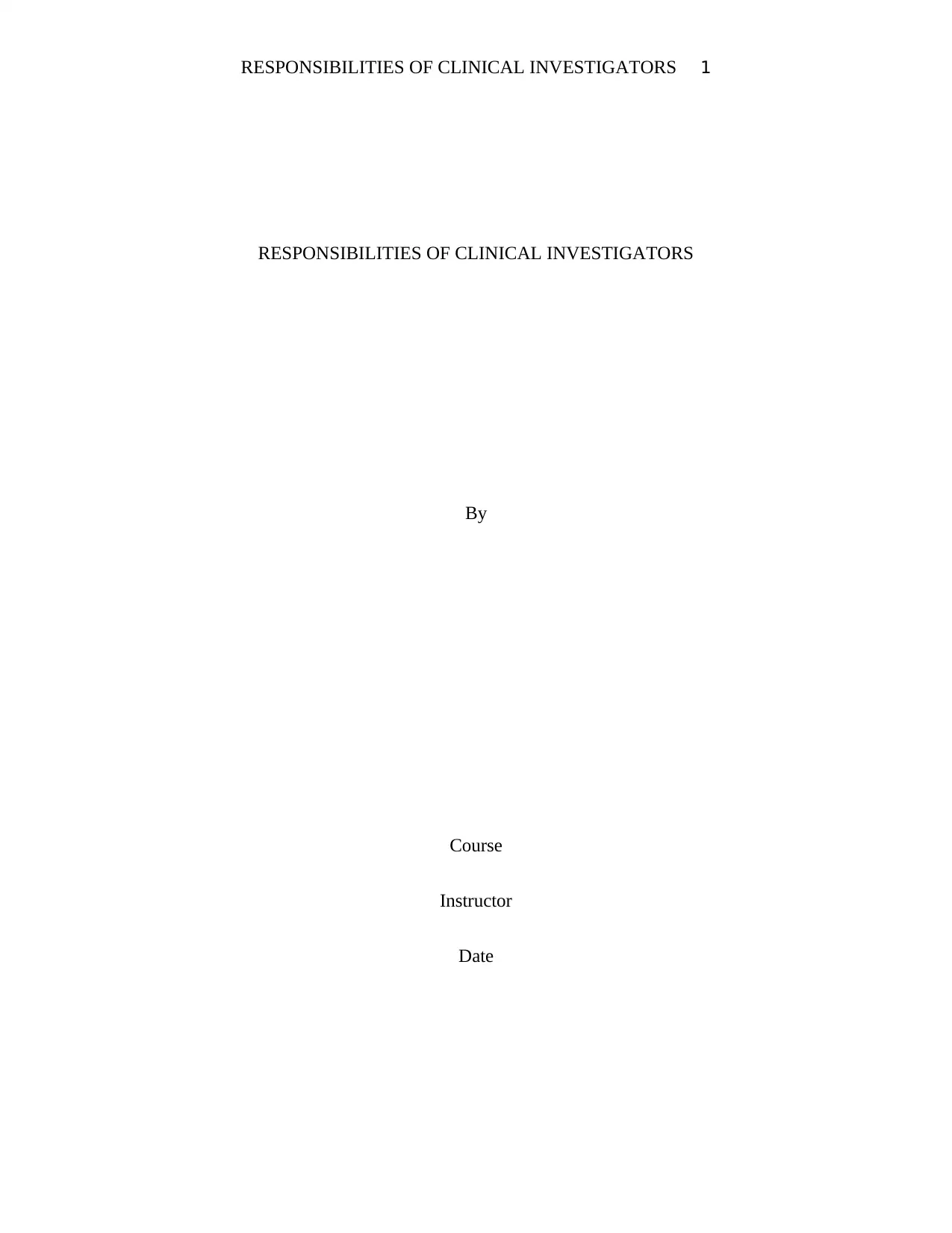
RESPONSIBILITIES OF CLINICAL INVESTIGATORS 1
RESPONSIBILITIES OF CLINICAL INVESTIGATORS
By
Course
Instructor
Date
RESPONSIBILITIES OF CLINICAL INVESTIGATORS
By
Course
Instructor
Date
Paraphrase This Document
Need a fresh take? Get an instant paraphrase of this document with our AI Paraphraser
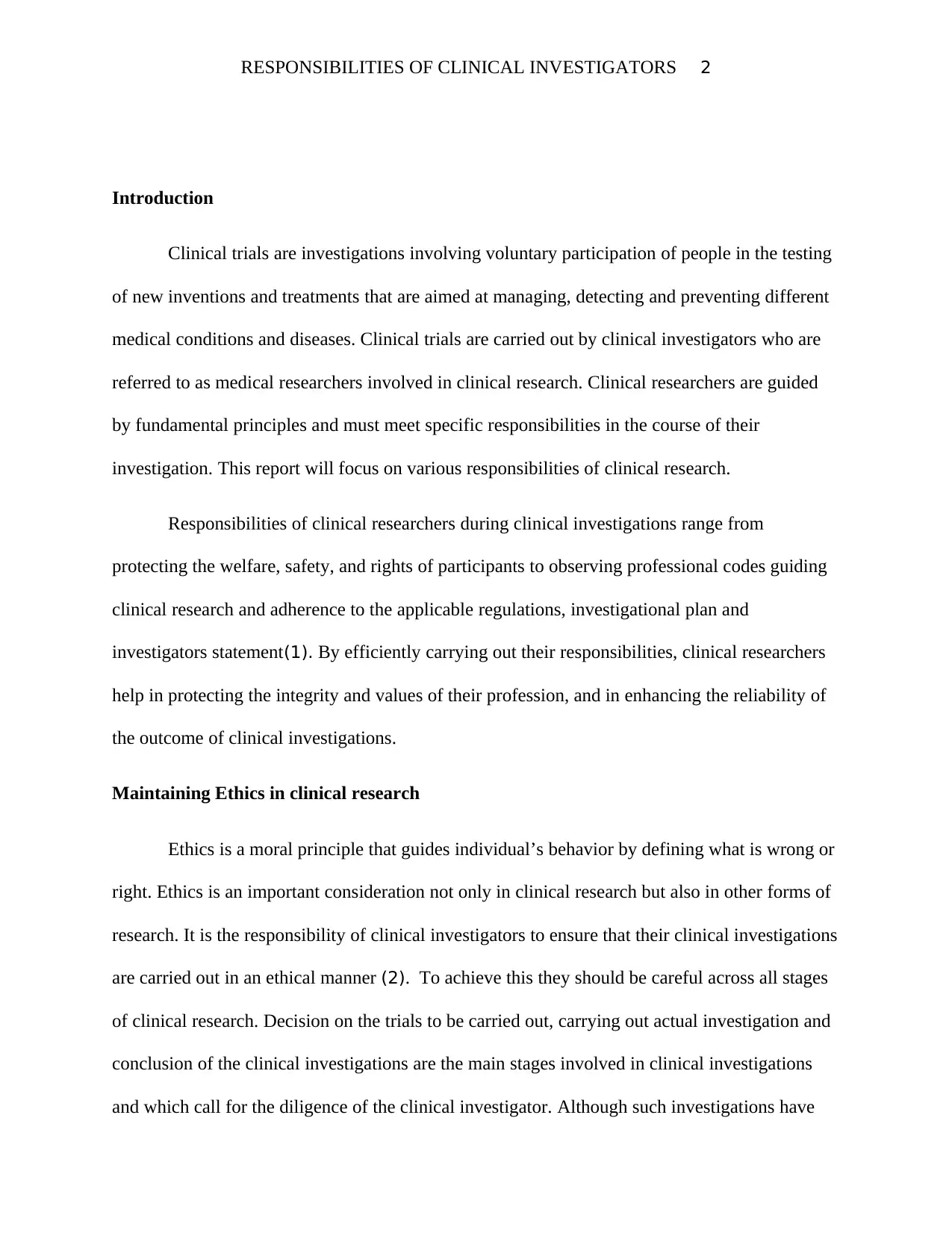
RESPONSIBILITIES OF CLINICAL INVESTIGATORS 2
Introduction
Clinical trials are investigations involving voluntary participation of people in the testing
of new inventions and treatments that are aimed at managing, detecting and preventing different
medical conditions and diseases. Clinical trials are carried out by clinical investigators who are
referred to as medical researchers involved in clinical research. Clinical researchers are guided
by fundamental principles and must meet specific responsibilities in the course of their
investigation. This report will focus on various responsibilities of clinical research.
Responsibilities of clinical researchers during clinical investigations range from
protecting the welfare, safety, and rights of participants to observing professional codes guiding
clinical research and adherence to the applicable regulations, investigational plan and
investigators statement(1). By efficiently carrying out their responsibilities, clinical researchers
help in protecting the integrity and values of their profession, and in enhancing the reliability of
the outcome of clinical investigations.
Maintaining Ethics in clinical research
Ethics is a moral principle that guides individual’s behavior by defining what is wrong or
right. Ethics is an important consideration not only in clinical research but also in other forms of
research. It is the responsibility of clinical investigators to ensure that their clinical investigations
are carried out in an ethical manner (2). To achieve this they should be careful across all stages
of clinical research. Decision on the trials to be carried out, carrying out actual investigation and
conclusion of the clinical investigations are the main stages involved in clinical investigations
and which call for the diligence of the clinical investigator. Although such investigations have
Introduction
Clinical trials are investigations involving voluntary participation of people in the testing
of new inventions and treatments that are aimed at managing, detecting and preventing different
medical conditions and diseases. Clinical trials are carried out by clinical investigators who are
referred to as medical researchers involved in clinical research. Clinical researchers are guided
by fundamental principles and must meet specific responsibilities in the course of their
investigation. This report will focus on various responsibilities of clinical research.
Responsibilities of clinical researchers during clinical investigations range from
protecting the welfare, safety, and rights of participants to observing professional codes guiding
clinical research and adherence to the applicable regulations, investigational plan and
investigators statement(1). By efficiently carrying out their responsibilities, clinical researchers
help in protecting the integrity and values of their profession, and in enhancing the reliability of
the outcome of clinical investigations.
Maintaining Ethics in clinical research
Ethics is a moral principle that guides individual’s behavior by defining what is wrong or
right. Ethics is an important consideration not only in clinical research but also in other forms of
research. It is the responsibility of clinical investigators to ensure that their clinical investigations
are carried out in an ethical manner (2). To achieve this they should be careful across all stages
of clinical research. Decision on the trials to be carried out, carrying out actual investigation and
conclusion of the clinical investigations are the main stages involved in clinical investigations
and which call for the diligence of the clinical investigator. Although such investigations have
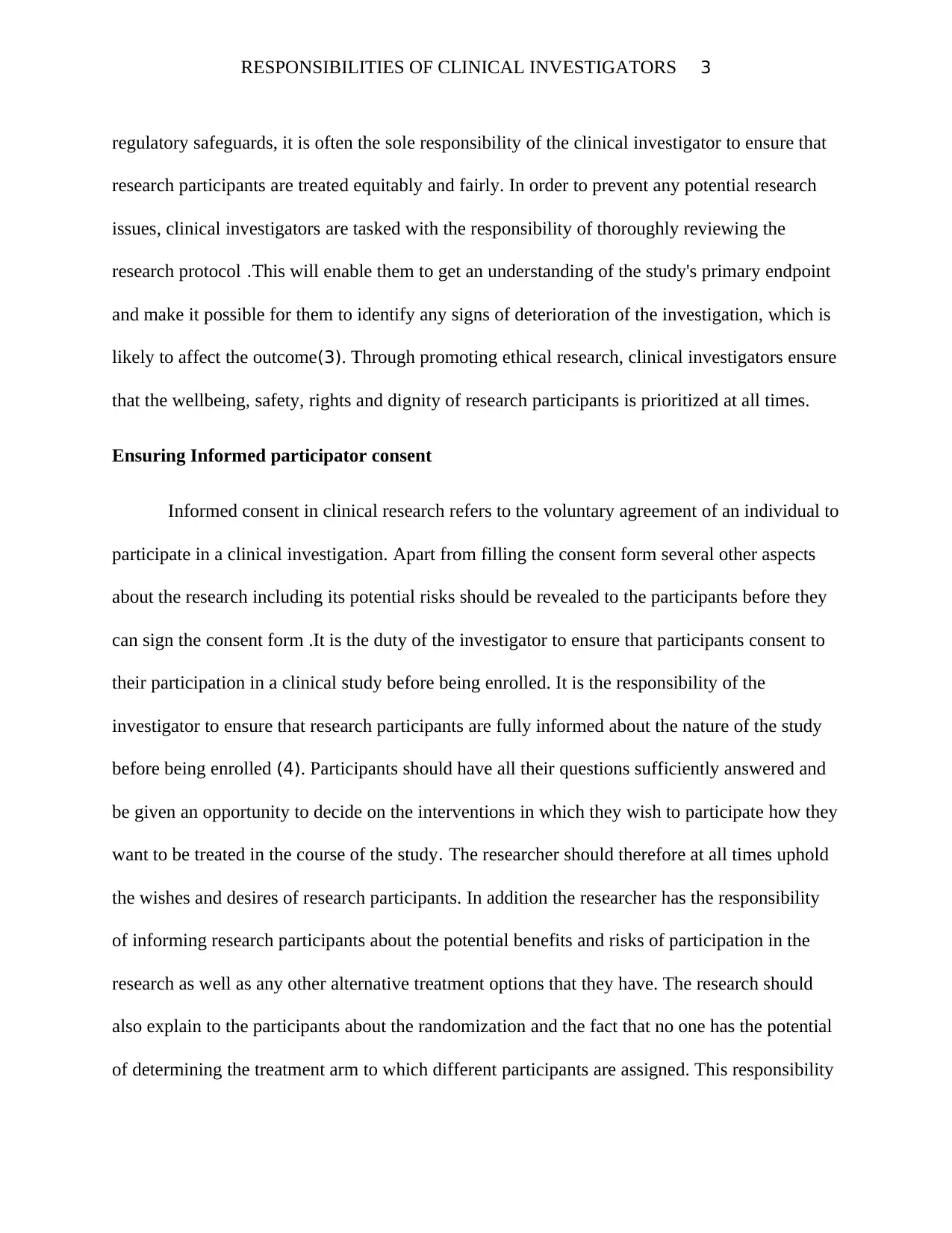
RESPONSIBILITIES OF CLINICAL INVESTIGATORS 3
regulatory safeguards, it is often the sole responsibility of the clinical investigator to ensure that
research participants are treated equitably and fairly. In order to prevent any potential research
issues, clinical investigators are tasked with the responsibility of thoroughly reviewing the
research protocol .This will enable them to get an understanding of the study's primary endpoint
and make it possible for them to identify any signs of deterioration of the investigation, which is
likely to affect the outcome(3). Through promoting ethical research, clinical investigators ensure
that the wellbeing, safety, rights and dignity of research participants is prioritized at all times.
Ensuring Informed participator consent
Informed consent in clinical research refers to the voluntary agreement of an individual to
participate in a clinical investigation. Apart from filling the consent form several other aspects
about the research including its potential risks should be revealed to the participants before they
can sign the consent form .It is the duty of the investigator to ensure that participants consent to
their participation in a clinical study before being enrolled. It is the responsibility of the
investigator to ensure that research participants are fully informed about the nature of the study
before being enrolled (4). Participants should have all their questions sufficiently answered and
be given an opportunity to decide on the interventions in which they wish to participate how they
want to be treated in the course of the study. The researcher should therefore at all times uphold
the wishes and desires of research participants. In addition the researcher has the responsibility
of informing research participants about the potential benefits and risks of participation in the
research as well as any other alternative treatment options that they have. The research should
also explain to the participants about the randomization and the fact that no one has the potential
of determining the treatment arm to which different participants are assigned. This responsibility
regulatory safeguards, it is often the sole responsibility of the clinical investigator to ensure that
research participants are treated equitably and fairly. In order to prevent any potential research
issues, clinical investigators are tasked with the responsibility of thoroughly reviewing the
research protocol .This will enable them to get an understanding of the study's primary endpoint
and make it possible for them to identify any signs of deterioration of the investigation, which is
likely to affect the outcome(3). Through promoting ethical research, clinical investigators ensure
that the wellbeing, safety, rights and dignity of research participants is prioritized at all times.
Ensuring Informed participator consent
Informed consent in clinical research refers to the voluntary agreement of an individual to
participate in a clinical investigation. Apart from filling the consent form several other aspects
about the research including its potential risks should be revealed to the participants before they
can sign the consent form .It is the duty of the investigator to ensure that participants consent to
their participation in a clinical study before being enrolled. It is the responsibility of the
investigator to ensure that research participants are fully informed about the nature of the study
before being enrolled (4). Participants should have all their questions sufficiently answered and
be given an opportunity to decide on the interventions in which they wish to participate how they
want to be treated in the course of the study. The researcher should therefore at all times uphold
the wishes and desires of research participants. In addition the researcher has the responsibility
of informing research participants about the potential benefits and risks of participation in the
research as well as any other alternative treatment options that they have. The research should
also explain to the participants about the randomization and the fact that no one has the potential
of determining the treatment arm to which different participants are assigned. This responsibility
⊘ This is a preview!⊘
Do you want full access?
Subscribe today to unlock all pages.

Trusted by 1+ million students worldwide
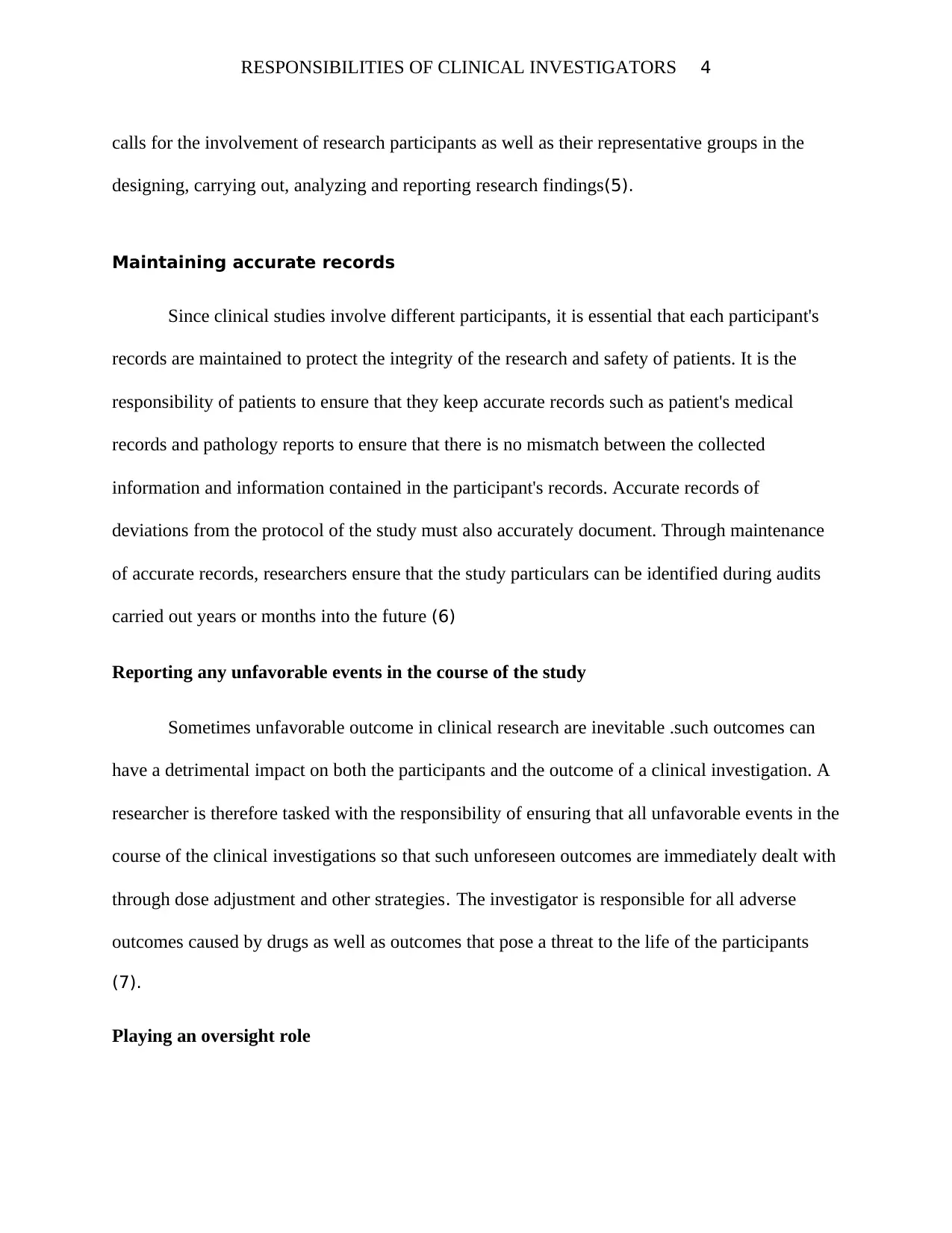
RESPONSIBILITIES OF CLINICAL INVESTIGATORS 4
calls for the involvement of research participants as well as their representative groups in the
designing, carrying out, analyzing and reporting research findings(5).
Maintaining accurate records
Since clinical studies involve different participants, it is essential that each participant's
records are maintained to protect the integrity of the research and safety of patients. It is the
responsibility of patients to ensure that they keep accurate records such as patient's medical
records and pathology reports to ensure that there is no mismatch between the collected
information and information contained in the participant's records. Accurate records of
deviations from the protocol of the study must also accurately document. Through maintenance
of accurate records, researchers ensure that the study particulars can be identified during audits
carried out years or months into the future (6)
Reporting any unfavorable events in the course of the study
Sometimes unfavorable outcome in clinical research are inevitable .such outcomes can
have a detrimental impact on both the participants and the outcome of a clinical investigation. A
researcher is therefore tasked with the responsibility of ensuring that all unfavorable events in the
course of the clinical investigations so that such unforeseen outcomes are immediately dealt with
through dose adjustment and other strategies. The investigator is responsible for all adverse
outcomes caused by drugs as well as outcomes that pose a threat to the life of the participants
(7).
Playing an oversight role
calls for the involvement of research participants as well as their representative groups in the
designing, carrying out, analyzing and reporting research findings(5).
Maintaining accurate records
Since clinical studies involve different participants, it is essential that each participant's
records are maintained to protect the integrity of the research and safety of patients. It is the
responsibility of patients to ensure that they keep accurate records such as patient's medical
records and pathology reports to ensure that there is no mismatch between the collected
information and information contained in the participant's records. Accurate records of
deviations from the protocol of the study must also accurately document. Through maintenance
of accurate records, researchers ensure that the study particulars can be identified during audits
carried out years or months into the future (6)
Reporting any unfavorable events in the course of the study
Sometimes unfavorable outcome in clinical research are inevitable .such outcomes can
have a detrimental impact on both the participants and the outcome of a clinical investigation. A
researcher is therefore tasked with the responsibility of ensuring that all unfavorable events in the
course of the clinical investigations so that such unforeseen outcomes are immediately dealt with
through dose adjustment and other strategies. The investigator is responsible for all adverse
outcomes caused by drugs as well as outcomes that pose a threat to the life of the participants
(7).
Playing an oversight role
Paraphrase This Document
Need a fresh take? Get an instant paraphrase of this document with our AI Paraphraser
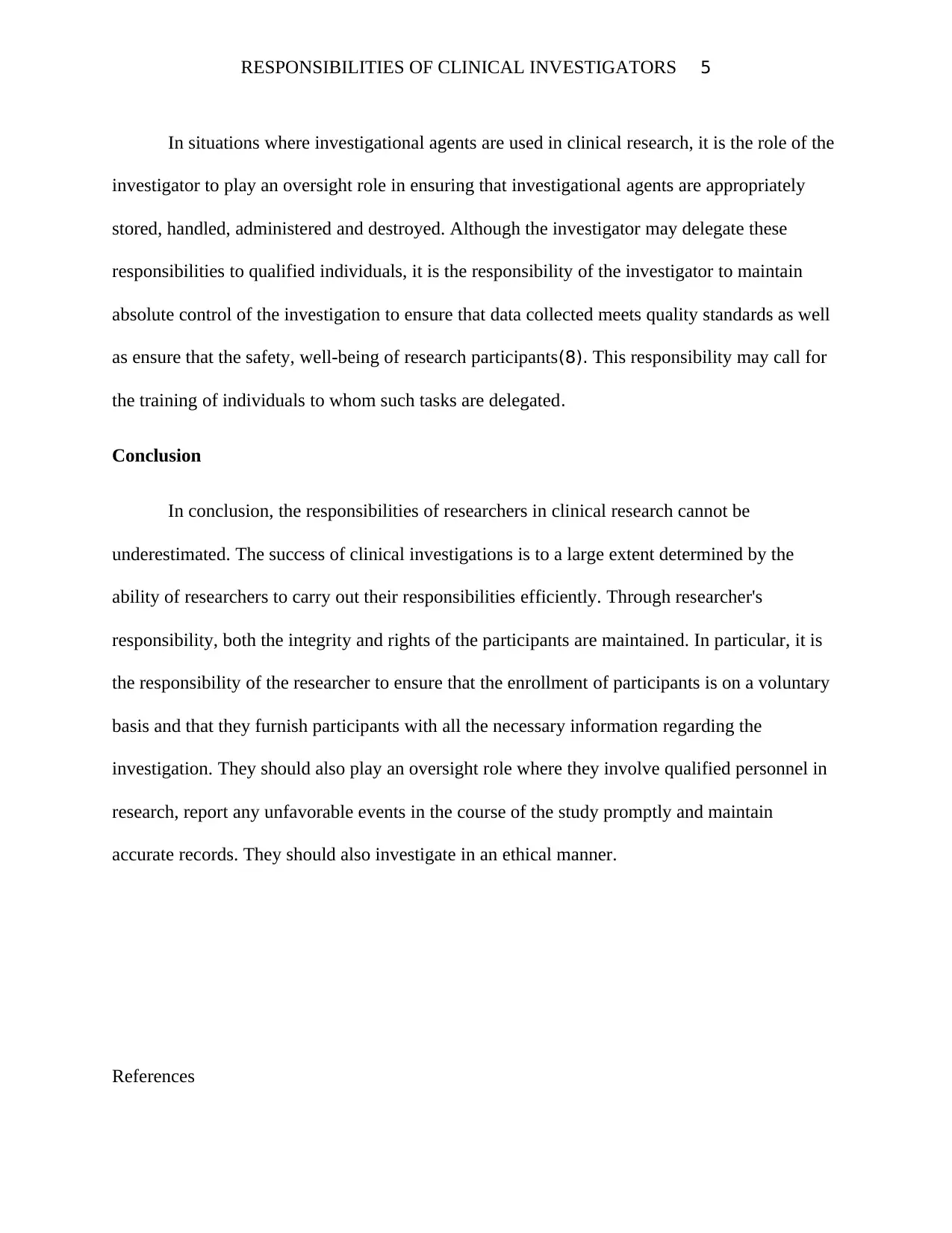
RESPONSIBILITIES OF CLINICAL INVESTIGATORS 5
In situations where investigational agents are used in clinical research, it is the role of the
investigator to play an oversight role in ensuring that investigational agents are appropriately
stored, handled, administered and destroyed. Although the investigator may delegate these
responsibilities to qualified individuals, it is the responsibility of the investigator to maintain
absolute control of the investigation to ensure that data collected meets quality standards as well
as ensure that the safety, well-being of research participants(8). This responsibility may call for
the training of individuals to whom such tasks are delegated.
Conclusion
In conclusion, the responsibilities of researchers in clinical research cannot be
underestimated. The success of clinical investigations is to a large extent determined by the
ability of researchers to carry out their responsibilities efficiently. Through researcher's
responsibility, both the integrity and rights of the participants are maintained. In particular, it is
the responsibility of the researcher to ensure that the enrollment of participants is on a voluntary
basis and that they furnish participants with all the necessary information regarding the
investigation. They should also play an oversight role where they involve qualified personnel in
research, report any unfavorable events in the course of the study promptly and maintain
accurate records. They should also investigate in an ethical manner.
References
In situations where investigational agents are used in clinical research, it is the role of the
investigator to play an oversight role in ensuring that investigational agents are appropriately
stored, handled, administered and destroyed. Although the investigator may delegate these
responsibilities to qualified individuals, it is the responsibility of the investigator to maintain
absolute control of the investigation to ensure that data collected meets quality standards as well
as ensure that the safety, well-being of research participants(8). This responsibility may call for
the training of individuals to whom such tasks are delegated.
Conclusion
In conclusion, the responsibilities of researchers in clinical research cannot be
underestimated. The success of clinical investigations is to a large extent determined by the
ability of researchers to carry out their responsibilities efficiently. Through researcher's
responsibility, both the integrity and rights of the participants are maintained. In particular, it is
the responsibility of the researcher to ensure that the enrollment of participants is on a voluntary
basis and that they furnish participants with all the necessary information regarding the
investigation. They should also play an oversight role where they involve qualified personnel in
research, report any unfavorable events in the course of the study promptly and maintain
accurate records. They should also investigate in an ethical manner.
References
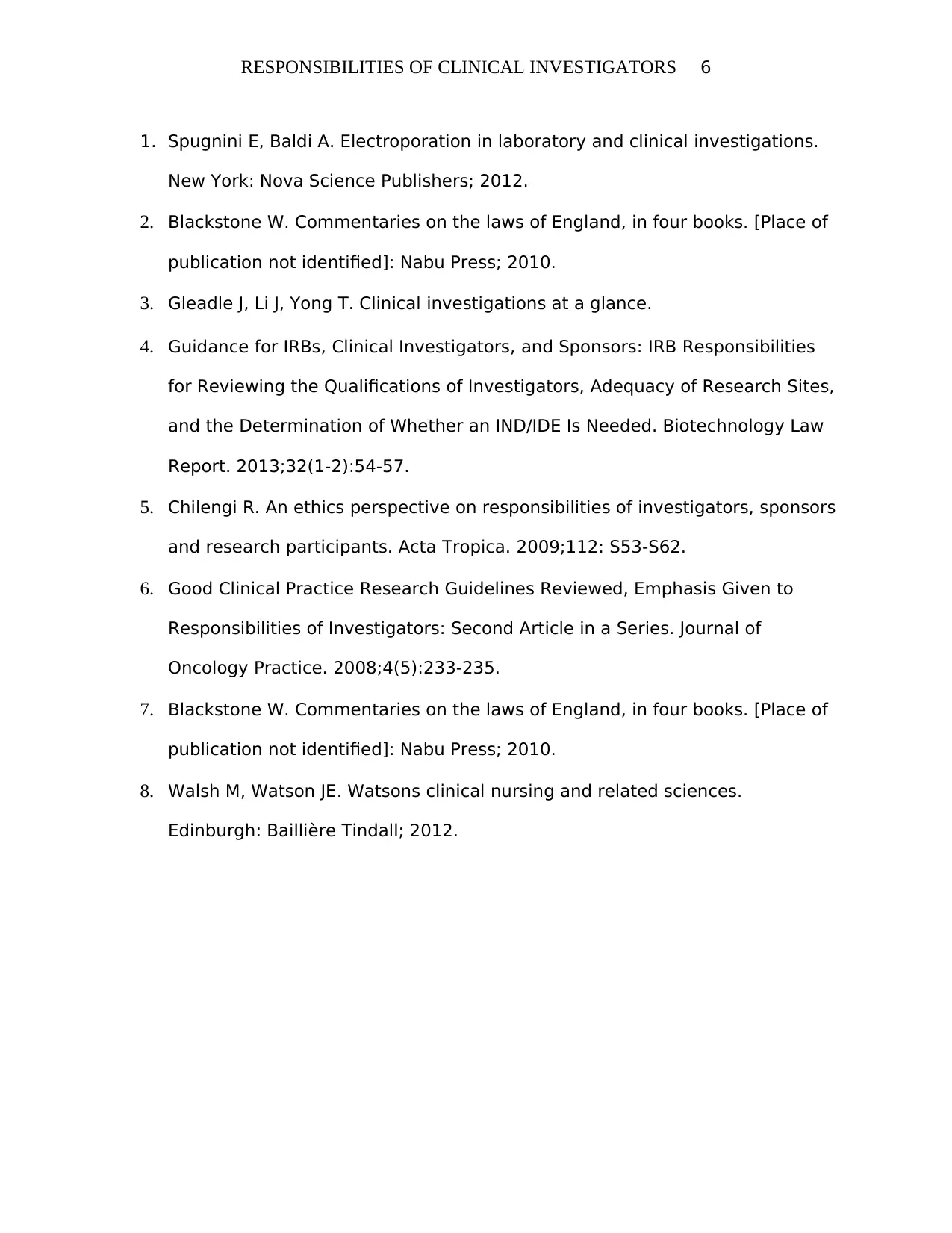
RESPONSIBILITIES OF CLINICAL INVESTIGATORS 6
1. Spugnini E, Baldi A. Electroporation in laboratory and clinical investigations.
New York: Nova Science Publishers; 2012.
2. Blackstone W. Commentaries on the laws of England, in four books. [Place of
publication not identified]: Nabu Press; 2010.
3. Gleadle J, Li J, Yong T. Clinical investigations at a glance.
4. Guidance for IRBs, Clinical Investigators, and Sponsors: IRB Responsibilities
for Reviewing the Qualifications of Investigators, Adequacy of Research Sites,
and the Determination of Whether an IND/IDE Is Needed. Biotechnology Law
Report. 2013;32(1-2):54-57.
5. Chilengi R. An ethics perspective on responsibilities of investigators, sponsors
and research participants. Acta Tropica. 2009;112: S53-S62.
6. Good Clinical Practice Research Guidelines Reviewed, Emphasis Given to
Responsibilities of Investigators: Second Article in a Series. Journal of
Oncology Practice. 2008;4(5):233-235.
7. Blackstone W. Commentaries on the laws of England, in four books. [Place of
publication not identified]: Nabu Press; 2010.
8. Walsh M, Watson JE. Watsons clinical nursing and related sciences.
Edinburgh: Baillière Tindall; 2012.
1. Spugnini E, Baldi A. Electroporation in laboratory and clinical investigations.
New York: Nova Science Publishers; 2012.
2. Blackstone W. Commentaries on the laws of England, in four books. [Place of
publication not identified]: Nabu Press; 2010.
3. Gleadle J, Li J, Yong T. Clinical investigations at a glance.
4. Guidance for IRBs, Clinical Investigators, and Sponsors: IRB Responsibilities
for Reviewing the Qualifications of Investigators, Adequacy of Research Sites,
and the Determination of Whether an IND/IDE Is Needed. Biotechnology Law
Report. 2013;32(1-2):54-57.
5. Chilengi R. An ethics perspective on responsibilities of investigators, sponsors
and research participants. Acta Tropica. 2009;112: S53-S62.
6. Good Clinical Practice Research Guidelines Reviewed, Emphasis Given to
Responsibilities of Investigators: Second Article in a Series. Journal of
Oncology Practice. 2008;4(5):233-235.
7. Blackstone W. Commentaries on the laws of England, in four books. [Place of
publication not identified]: Nabu Press; 2010.
8. Walsh M, Watson JE. Watsons clinical nursing and related sciences.
Edinburgh: Baillière Tindall; 2012.
⊘ This is a preview!⊘
Do you want full access?
Subscribe today to unlock all pages.

Trusted by 1+ million students worldwide
1 out of 6
Related Documents
Your All-in-One AI-Powered Toolkit for Academic Success.
+13062052269
info@desklib.com
Available 24*7 on WhatsApp / Email
![[object Object]](/_next/static/media/star-bottom.7253800d.svg)
Unlock your academic potential
Copyright © 2020–2026 A2Z Services. All Rights Reserved. Developed and managed by ZUCOL.





